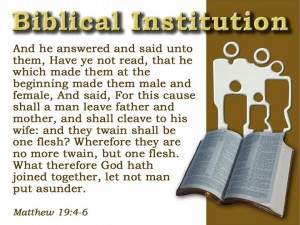As we have seen, discipleship with its consequent commitment in the covenant of baptism, joins us to Christ in a personal sense. We are not only individually living by faith, we are part of Christ and the other believers joined to him (Galatians 3:27-29). Our family relationship is:
- Sons and daughters of God (1 John 3:1)
- Brothers and sisters of Christ (Matthew 12:48-50))
As members of God’s family, we must exhibit God’s character. The children of God are distinguished BY THEIR BEHAVIOUR (John 8:39; Matt 5:16; John 13:35; Matt 7:20).
A Building a Pattern of Godliness
 God is holy, and commands us to be like him (1 Peter 1:15,16). The keeping of the commandments is not to be understood as merely “keeping the rules”. It is a command to “be holy, even as I (God) am holy”. Peter is here quoting from the Old Testament (Leviticus 11:44). The context in Leviticus shows that a believer’s way of life must be affected, and if they truly desire to follow God, they will not take part in “unclean” practices.
God is holy, and commands us to be like him (1 Peter 1:15,16). The keeping of the commandments is not to be understood as merely “keeping the rules”. It is a command to “be holy, even as I (God) am holy”. Peter is here quoting from the Old Testament (Leviticus 11:44). The context in Leviticus shows that a believer’s way of life must be affected, and if they truly desire to follow God, they will not take part in “unclean” practices.
Philippians 4:8 – This wonderful quotation, shows that the real “secret” of godliness is to fill the mind with things that are lovely, honest, just, pure, praiseworthy… The mind is affected with the stream of thoughts that go through it. The increase in violence, dishonesty, crime and sexual depravity owes much to rude, suggestive films and advertisements. The law of nature is “you reap what you sow”. (Galatians 6:7)
Be “God conscious” – conscious of His greatness, His majesty, His goodness and care (Psalm 111). God is the “Lord of all the earth” (Psalm 97:5) and He has graciously permitted us to have the benefit of His earth. When we are conscious of God’s greatness and His mercy to us, then our thoughts and actions are affected. We seek to honour Him, and do not seek “the glory of men” (Matthew 6:2, 13).
To be appreciative of God will put us in our proper place (Isaiah 66:2)
Prayer and Personal reading
We can’t do it alone. God welcomes our prayer, because it shows our dependence upon Him. We need a ‘two-way communication’ with God – to diligently, regularly read His Word and to speak to Him in prayer. A summary Bible Reading Chart that can help you.
God has promised to help us. Jesus Christ has been appointed our faithful High Priest. Having experienced human trial, he is able to respond to our need (Heb 4:14-16).
Ask and God will assist us (James 1:5-7; Matthew 7:7,8). When we ask, we are in a receptive frame of mind.
Prayer puts God in His rightful place. Be careful not to make prayer a list of “wants”. (In Matthew 6 :7-13 Jesus taught that prayer begins with Praise, followed by petition and concludes with praise).
Whatever activities we engage in, be conscious that the Lord may have something else in mind. It may be quite a legitimate activity, but not be in accordance with “the Lord’s will” (James 4:15).
B Keeping the Commandments of Christ
 There is an attachment between the disciple and his Lord. There is a need to come to “know” him (John 17:3) and we can only do this by ‘keeping company’ with him, in reading the Bible and endeavouring to keep his commandments, walking in his ways.
There is an attachment between the disciple and his Lord. There is a need to come to “know” him (John 17:3) and we can only do this by ‘keeping company’ with him, in reading the Bible and endeavouring to keep his commandments, walking in his ways.
Loving Christ involves keeping his commandments (John 14:15, 23; 15:10, 14, 15).
These commandments involve a moral way of life. (Matthew 19:18,19).
The commandments involve a honest, diligent and respectful attitude to our employers and rulers. (1 Peter 2:12-14; 1 Timothy 6:1-3; Colossians 3:22).
They also involve ministering to others (service).
We are “servants” of Christ (John 13:13-16).
Once we make the commitment to serve Christ, we “are not our own, we are bought with a price” (1 Corinthians 6:19,20). Life involves selflessness, putting the cause of Christ first, putting the welfare of others before our own. Paul explains that serving Christ means taking on Christ’s identity, so that we are changed. (Galatians 2:20; 2 Corinthians 5:17)
C Failure and Forgiveness
 The problem is SIN –
The problem is SIN –
How do we deal with sin and temptation?
-
What is sin? Disobedience of the law of God (1 John 3:4).
-
Despite our best resolve, sin is inherent in us. We will fail from time to time. It will be a struggle. The Apostle Paul described the acute struggle to do the will of God. It is likened to a warfare and takes a conscious effort to meet its challenges (Romans 7:18,22-25). The Lord Jesus himself experienced this struggle – “Not my will, but thine, be done” (Luke 22:42). This quotation shows that there were two wills in the mind of Christ, and he had to willingly give over his own will to that of his Father’s. But the prize is great “to him that overcometh will I give power over the nations” (Revelation 2:26,27).
-
Flee from sin and temptation – 1 Corinthians 10:13,14. There is no point remaining in a situation where we are likely to be tempted. Make the decision to remove ourselves from situations and places which may lead us to sin. A good test is to ask ourselves, “Would I like Christ to see me here?”
-
When we belong to Christ, we “have crucified the flesh with the affections and lusts” (Galatians 5:24). Paul lists what the works of the flesh are in Galatians 5:19-21; they are all the desires that promote what WE want to do, and will prevent us inheriting the Kingdom of God (v21).
-
Do battle with evil, mean or unhelpful thoughts. Paul describes this like engaging in war against a strong fortress: “Cast down reasonings and every high thing that exalts itself against the knowledge of God and bring into captivity every thought to the obedience of Christ”. (2 Corinthians 10:4,5)
-
Guard the heart to prevent being deflected from the great cause to which you have set your mind. Sin begins when a person is “tempted when he is drawn away of his own lust and enticed…” (James 1:14) Therefore be not drawn away, and “look not to lust after…” (Matthew 5:28). Simply never go anywhere, read anything, look at anything, that cannot meet this criteria: “Whatsoever things are lovely, good…” (Philippians 4:8).
-
Fill the mind with good things – the mind is insensibly affected by the stream of thought that passes through it. Make yourself some simple guidelines from the Word of God – no help to be negative; it never helped the nation of Israel. In places where you have some control, fill your life and your home with profitable, wholesome things.
Forgiveness is available
-
God is abounding in compassion and loving kindness (mercy). He is ready to forgive, and to assist us in our efforts to serve Him, for He desires to complete the work begun in us (Philippians 1:6)
-
God has revealed Himself in Christ working for our reconciliation (2 Corinthians 5:19)
-
God has provided the means through the Lord Jesus Christ, who will be our advocate (1 John 2:1). We can have every confidence in this, because the Lord Jesus knows the weakness of our human condition and thus sympathizes with us (Hebrews 2:18). For this reason “we may come boldly unto the throne of grace, that we may obtain mercy and find grace to help in time of need” (Hebrews 4:15,16).
D Married and Single Life
 Genesis 2:23, 24: Jesus Christ makes a divine comment (Matthew 19:4-6), taking the Jews of his day to task for their easy attitude to divorce. He shows that it was God’s intention that marriage would be for life, and that if marriage partners ended their marriage, God was challenged. “Let not man divide.” Marriage is designed for mutual companionship, and to produce “a godly seed”, children brought up to walk in the ways of God. (Malachi 2:14,15)
Genesis 2:23, 24: Jesus Christ makes a divine comment (Matthew 19:4-6), taking the Jews of his day to task for their easy attitude to divorce. He shows that it was God’s intention that marriage would be for life, and that if marriage partners ended their marriage, God was challenged. “Let not man divide.” Marriage is designed for mutual companionship, and to produce “a godly seed”, children brought up to walk in the ways of God. (Malachi 2:14,15)
Family life
God regards the children of the marriage as His, and gives us guidance. Beware the youth culture that separates children from families, and young people from adults. You will have to work hard at it, because traditional families are now becoming a rare breed (Psalm 127). Notice that family life begins with the parents “walking in His ways” (Psalm 128 note v1).
Single Life
If one is married, he/she has obligations to perform and must consider the other in whatsoever service he desires to perform for Christ. However, the single life permits one to serve God without being distracted by the needs of a marriage partner (1 Corinthians 7:32-35; 1 Timothy 5:2; Matthew 19:12). In modern culture, the unattached is sometimes viewed questionably, but such a person can engage in a very fulfilling life serving Christ and the needs of the ecclesia.
Next Lesson: The Disciple in the House of God – we must meet and encourage each other to grow in united faith and worship.




